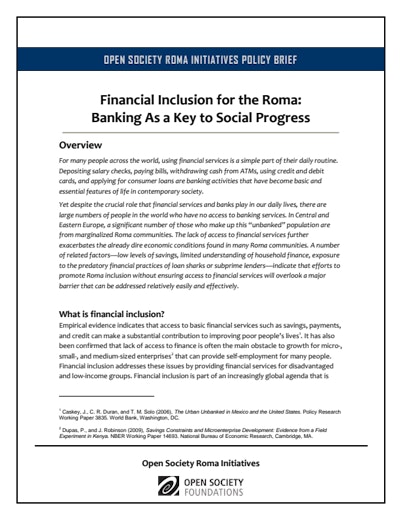For many people across the world, using financial services is a simple part of their daily routine. From depositing salary checks to applying for consumer loans, banking activities are basic and essential features of life in contemporary society.
Yet there are still large numbers of people in the world who have no access to banking services. In Central and Eastern Europe, Roma make up a significant number of this “unbanked” population. The lack of access to financial services further exacerbates the already dire economic conditions found in many Roma communities.
Financial inclusion—making basic financial services such as savings, payments, and credit accessible—can help improve poor people’s lives and contribute to the growth of micro-, small-, and medium-sized enterprises that can provide self-employment for many.
Using financial inclusion to give Roma access to the basic and vital services offered by banks is as important a component of Roma inclusion as employment, housing, health or education. In order to truly make a difference in the lives of Roma communities across Central and Eastern Europe, advocates and policymakers must make financial inclusion a well-integrated element of Roma inclusion efforts.
Download
-
Financial Inclusion for the Roma: Banking As a Key to Social Progress (755.75 Kb pdf file)
Download the complete 9-page document.
Read more
Voices In Depth
Inside the Archives: George Soros and the Fight for Roma Dignity

For over 40 years, George Soros has been the leading private supporter of Europe’s Roma—the continent’s largest and most excluded ethnic minority—championing Roma leaders in their fight for equality and against deep-rooted discrimination.
Roma Rights
A New Roma-led Vision of Power

The new, independent, Roma Foundation for Europe is backed by a €100 million pledge that builds on Open Society’s over 30 years of support for Roma causes.
Roma Rights
Q&A: A Step Toward Justice for Roma Women

In November, the Slovak Republic formally apologized to Roma women for a program of forced sterilizations that stretched out for decades. How a Slovak human rights group helped hold the government accountable.
